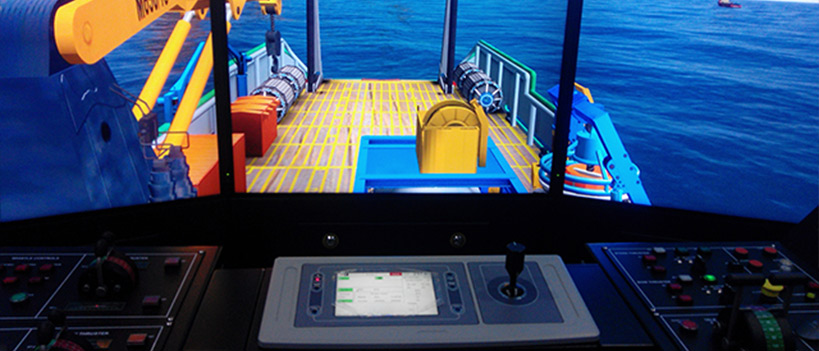DP Simulator (Advanced) Course

DP Simulator (Advanced) Course
“Aquanaut Dynamic Positioning Centre” is a DP training institute that provides a DP Simulator (Advance) Course in Navi Mumbai (India) as per NI guidelines. The eligibility criteria to do this course is as follow
Criteria 1:
With the Induction (Basic) course certificate and having completed 30 DP days on board (For Candidates having attended the Induction course before 31st Decemeber 2014)
Criteria 2:
With the Induction (Basic) course certificate and having completed 60 DP days on board (For Candidates having attended the Induction course after 1st January 2015)
Candidates applying for this course must be holding a valid COC. Course will commence on every Monday
.
Objectives of the DP Simulator (Advanced) Course
.
 To be familiarized with the components of the DP system, which include DP Operator, Computer control Operating station (MMI), Thrusters and propellers, Heading reference system, Position reference system, Sensors and Power
To be familiarized with the components of the DP system, which include DP Operator, Computer control Operating station (MMI), Thrusters and propellers, Heading reference system, Position reference system, Sensors and Power To understand the Universal Transverse Mercator (UTM) System of projections used in Maps
To understand the Universal Transverse Mercator (UTM) System of projections used in Maps To be familiarized with the different types of Position reference systems , used in the DP system, including DGPS (Differential Global Positioning System), GNSS (Global Navigation Satellite System), Hydro-acoustic
To be familiarized with the different types of Position reference systems , used in the DP system, including DGPS (Differential Global Positioning System), GNSS (Global Navigation Satellite System), Hydro-acoustic Position Reference (HPR) System, ARTEMIS, Taut Wire Position Reference System, Laser Reference System and Rada-Scan (FM Radio) Reference System
Position Reference (HPR) System, ARTEMIS, Taut Wire Position Reference System, Laser Reference System and Rada-Scan (FM Radio) Reference System To understand the Advantages and Disadvantages of the DP system
To understand the Advantages and Disadvantages of the DP system To appreciate the DP system’s ability of “Redundancy”
To appreciate the DP system’s ability of “Redundancy” To understand the different types of Environmental sensors used in the DP system including current sensors, wind sensors (anemometer) and motion sensors.
To understand the different types of Environmental sensors used in the DP system including current sensors, wind sensors (anemometer) and motion sensors. To understand the different types of Thrusters and Propeller systems that may be found in DP vessels.
To understand the different types of Thrusters and Propeller systems that may be found in DP vessels. To understand the Power Management System onboard DP vessels.
To understand the Power Management System onboard DP vessels. To understand the factors associated with assessment of DP vessel Capabilities, including Capability Plots,
To understand the factors associated with assessment of DP vessel Capabilities, including Capability Plots, Footprint plots, Sensor and thruster operational limits etc.
Footprint plots, Sensor and thruster operational limits etc. To be familiarized with various DP system Alarms and failures including those associated with environmental changes and DP system control failure alarms
To be familiarized with various DP system Alarms and failures including those associated with environmental changes and DP system control failure alarms To understand Failure Modes and Effects Analysis (FMEAs)
To understand Failure Modes and Effects Analysis (FMEAs) To understand the different modes of operation available in the DP operating system and their applications in carrying out various offshore and subsea operations as listed below:
To understand the different modes of operation available in the DP operating system and their applications in carrying out various offshore and subsea operations as listed below:
a) FOLLOW TARGET mode in the use of ROV operations and diving operations.
b) AUTO TRACK mode in the use of PIPELAY and CABLE LAY operations.
c) AUTO PILOT or AUTO SAIL mode in the use of navigating the vessel within the oilfield.
d) WEATHER WANE option.
e) Rotating the vessel around various user defined centre of rotations while carrying out various critical operations.
f) Applications of DP in operations involving SATURATION DIVING.
g) Application of DP in Pipe-lay and Cable-lay operations.
h) Application of DP in ROV support vessels.
i) Application of DP in Drill ships.
j) Application of DP in Shuttle Tankers. To appreciate the Safety Procedures associated with DP vessels and DP vessel operations
To appreciate the Safety Procedures associated with DP vessels and DP vessel operations To understand factors that may lead to DP incidents (discussion of DP incidents / case studies)
To understand factors that may lead to DP incidents (discussion of DP incidents / case studies)
.
Career opportunities
.
At “Aquanaut Dynamic Positioning Centre” the practical training sessions are very thorough and circumstantial and therefore, candidates get a better understanding of everything. Once a candidate clears DP Simulator (Advanced) Course , they gain experience in the practical area of Dynamic Positioning, which is very different from theoretical training and a new and advanced career path is open to them. Dynamic positioning is used by much of the offshore oil industry for various applications such as Drilling, Pipelay/Cablelay, Dive support, ROV support, Well Intervention, Subsea Construction, Anchor handling, Offshore Supply etc coast There are currently more than 1800 DP ships.
.
ADPC offers various courses in Dynamic Positioning :
.
- DP Induction (Basic) Course
- DP Simulator (Advance) Course
- DP Maintenance Course
- High Voltage Course
- Basic Anchor Handling Course
.
